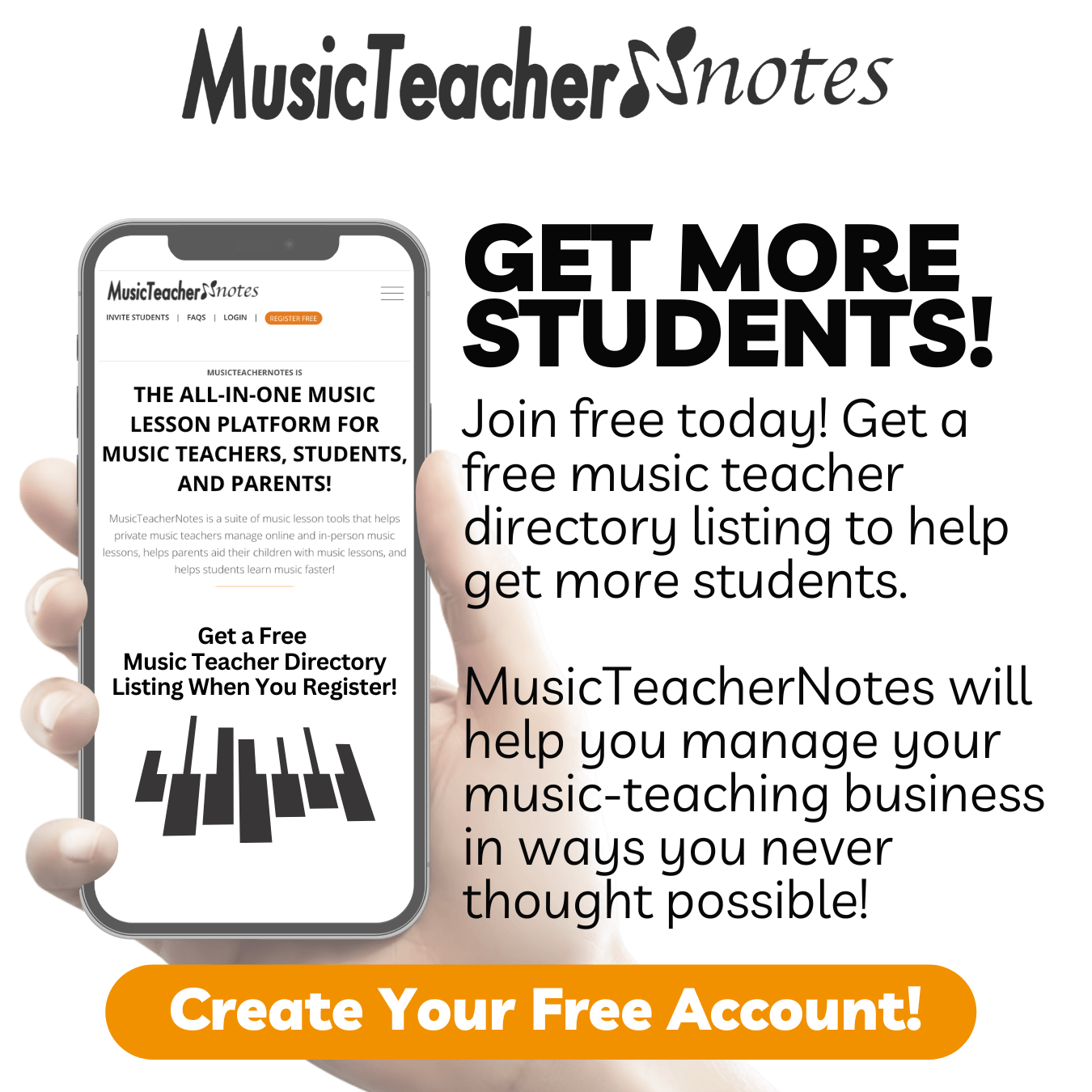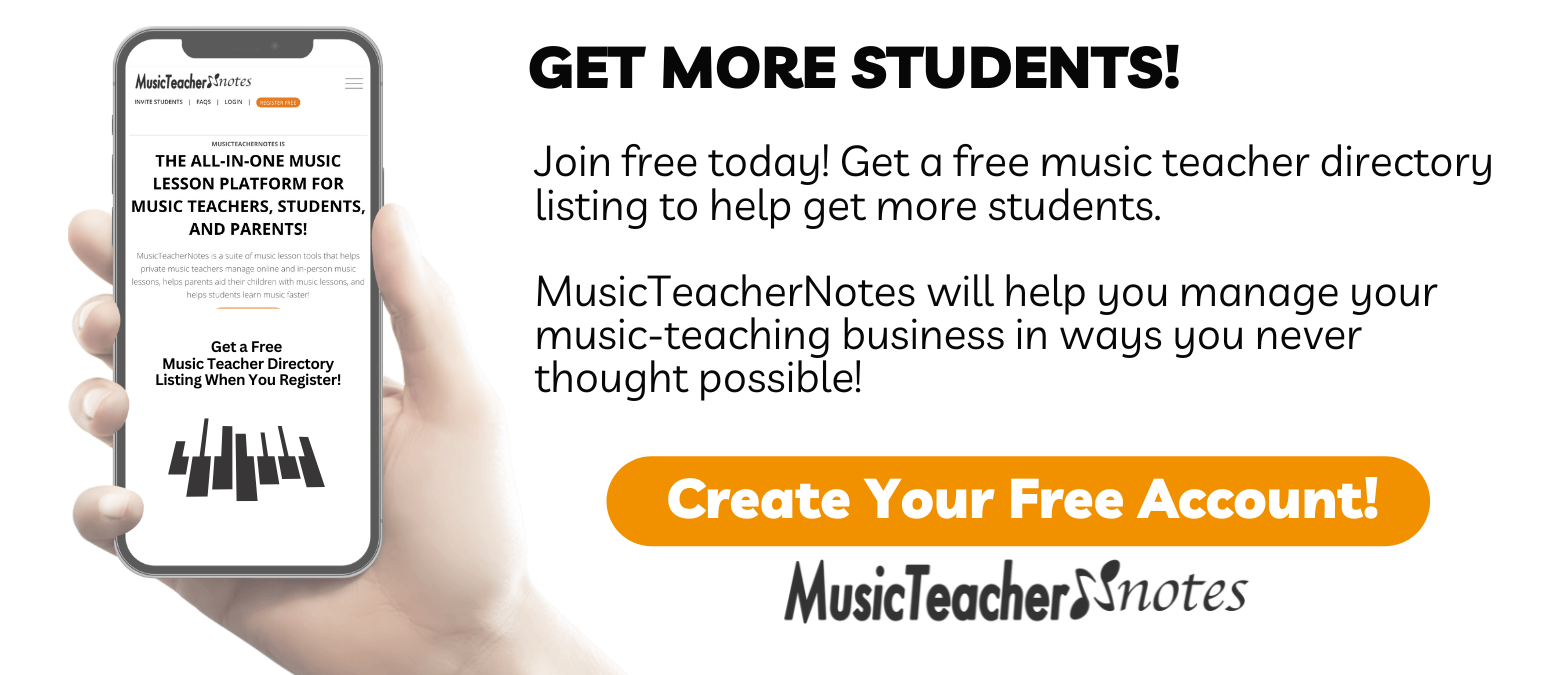 In today’s diverse and competitive world of music education, finding your unique voice and standing out from the crowd is crucial for success. This is where niche marketing comes into play, offering a strategic approach that empowers music teachers to carve out a distinct identity and connect with a targeted audience of students who share their passions and interests. Music teachers can unlock many benefits that differentiate them and amplify their impact by focusing on a specific genre, instrument, or teaching method. In this article, we explore the world of niche marketing for music teachers, exploring its many advantages, while unveiling effective strategies to implement niche marketing into your overall music teacher marketing plan.
In today’s diverse and competitive world of music education, finding your unique voice and standing out from the crowd is crucial for success. This is where niche marketing comes into play, offering a strategic approach that empowers music teachers to carve out a distinct identity and connect with a targeted audience of students who share their passions and interests. Music teachers can unlock many benefits that differentiate them and amplify their impact by focusing on a specific genre, instrument, or teaching method. In this article, we explore the world of niche marketing for music teachers, exploring its many advantages, while unveiling effective strategies to implement niche marketing into your overall music teacher marketing plan.
What is niche marketing in music education?
Within the realm of music education, various specialized segments or niches emerge. Teaching music to young beginners forms a niche market, just as offering music lessons for adults, music instruction for individuals with special needs, and tailored lessons for aspiring songwriters. Specializing in music lessons for kids with busy parents can be a form of niche marketing. These represent niche markets within the broader field of music education.
It can be tempting to try to appeal to all forms of music lessons, but studies on niche marketing show you are far better off focusing on niche marketing than trying to appeal to everyone.
What are the benefits of niche marketing for growing a music school?
Niche marketing can offer several benefits for private music teachers:
Targeted Audience: Focusing on a specific niche allows you to tailor your marketing efforts to a particular group of genuinely interested students. This increases the chances of attracting students who fit your teaching style and expertise well.
Expertise Recognition: By specializing in a particular genre, instrument, or teaching method, you can establish yourself as an expert in that niche. This enhances your credibility and makes students more likely to choose you over general music teachers.
Reduced Competition: Niche markets often compete less than broader markets. This means you’ll face fewer competitors, making standing out and gaining recognition easier.
Personalized Approach: Niche marketing allows you to tailor your teaching approach, curriculum, and materials to your target audience’s specific needs and interests. This personalized experience can lead to higher student satisfaction and retention.
Word of Mouth Growth: Satisfied students within a niche are likelier to recommend you to others with similar interests. This can lead to organic word-of-mouth growth within the niche community.
Higher Rates: Specialized expertise often justifies higher rates, as students recognize the value in learning from someone uniquely qualified in their chosen area of interest.
Passion and Engagement: Teaching within a niche you’re passionate about can lead to higher levels of engagement, which translates into enthusiastic and effective instruction.
Networking Opportunities: Niche markets often have dedicated events, forums, and communities. Engaging in these platforms can help you network with potential students, collaborators, and music teaching industry professionals.
Content Creation: Niche teaching allows you to create specialized content such as tutorials, videos, and articles catering to your target audience’s needs. This content can serve as a valuable marketing tool.
Long-Term Sustainability: Establishing yourself as a niche expert can lead to long-term success, as you become a go-to teacher for students who want to excel in that specific area.
In essence, niche marketing empowers private music teachers to leverage their unique strengths, connect with a like-minded student base, and position themselves as trusted experts in their chosen field, resulting in growth and success over time.
How do I use niche marketing and differentiate myself as a private music teacher?
Here are several ways music teachers can differentiate themselves and use niche marketing to attract more students:
Unique Teaching Style: Cultivating a unique teaching approach can significantly impact music students. By prioritizing creativity, personalized instruction, or specializing in a particular genre, you can truly differentiate yourself and provide an exceptional learning experience for your students. Your distinctive approach will set you apart, foster a deeper connection with music, and promote individual growth.
Specialized Expertise: Distinguish yourself from the crowd of general music teachers by becoming an expert in a specific instrument, technique, or music style. Specialization will showcase your dedication and give your students a unique and enriched learning experience. By honing your expertise, you’ll stand out as an expert in what you teach.
Innovative Technology: Elevate the music lesson journey by integrating technology into your teaching approach. Embrace online learning platforms, interactive apps, and music education tools to create an engaging educational experience. By merging traditional instruction with cutting-edge technology, you’ll empower your students with a dynamic and forward-looking approach to learning music.
Flexible Scheduling: Prioritize your students’ convenience by providing flexible music lesson schedules that cater to their busy lives. By offering adaptable time slots, you create an environment where learning music seamlessly integrates into their routines. This flexibility showcases your commitment to their growth and ensures that your students can pursue their musical passions without compromising their other commitments.
Performance Opportunities: Foster a well-rounded musical journey for your students by offering consistent opportunities to showcase their progress. Organize recitals, concerts, or open mic events that give them a platform to shine and share their musical accomplishments. These performance experiences boost their confidence and instill a sense of achievement, enhancing their overall growth as musicians.
Parent Involvement: Nurture a collaborative learning environment by keeping parents involved through regular progress updates, insightful practice tips, and valuable resources. Empower parents to actively support their child’s musical journey by offering them the necessary tools and information for helping their children practice music. This partnership between educators and parents creates a strong foundation for students, ensuring that their musical growth is nurtured inside and outside the classroom.
Customized Curriculum: Embrace personalization’s power by crafting lessons catering to each student’s aspirations, proficiency, and musical preferences. This tailored approach ensures that the learning plan is relevant and inspiring, propelling students enthusiastically toward their goals. By acknowledging individuality, you create an educational journey that is both effective and deeply rewarding.
Collaborations and Workshops: Foster a sense of camaraderie and collective learning by orchestrating collaborative projects, interactive workshops, or engaging group lessons. Through these endeavors, students can draw inspiration from one another, exchange insights, and collectively elevate their musical proficiency. By creating a dynamic learning environment that thrives on collaboration, you empower students to not only grow individually but also contribute to the enrichment of their peers’ musical journeys.
Comprehensive Resources: Enhance your music lessons by providing valuable supplementary materials such as sheet music, instructive music teaching videos, and curated music lesson resources. These music lesson tools deepen understanding and empower students to explore beyond the classroom, fostering a well-rounded musical education. By offering a wealth of resources, you create a supportive learning environment that nurtures growth and encourages students to thrive in their musical pursuits.
Trial Lessons or Guarantees: Extend a welcoming hand to prospective music students by offering a risk-free opportunity to experience your teaching through a complimentary trial lesson or a satisfaction guarantee. This demonstrates your confidence in the value of your instruction and ensures that students can make an informed decision about their musical education. By removing barriers and instilling trust, you create a pathway for students to embark on a transformative musical journey with confidence and enthusiasm.
Conclusion
As music education continues to evolve, the power of niche marketing becomes increasingly evident. By embracing a specific focus, music teachers can transcend the ordinary and create extraordinary learning experiences for their students. The benefits are abundant: from establishing expertise and fostering deep connections with students to elevating credibility and nurturing a community of like-minded learners. Through careful strategy implementation, personalized approaches, and dedication to their chosen niche, music teachers can shape their own success and enrich their students’ musical journeys. As you embark on your path as a music educator, remember that the road less traveled—the niche you choose—can lead to boundless growth, fulfillment, and a harmonious symphony of achievement.



 Do you want to get more students and grow your music teaching business?
Do you want to get more students and grow your music teaching business?